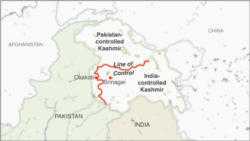With an eye on Afghanistan and China, an upcoming visit by U.S. Secretary of State Antony Blinken to India is expected to reaffirm a growing strategic partnership between Washington and New Delhi.
India’s Foreign Ministry has said that the discussions will focus on regional and global issues including the Indo-Pacific region, Afghanistan and the COVID-19 pandemic.
Blinken is scheduled to hold talks on Wednesday with his Indian counterpart, Subrahmanyam Jaishankar, and meet Indian Prime Minister Narendra Modi.
Indian analysts say the unfolding security situation in Afghanistan, where the Taliban are rapidly gaining control of territory as American troops withdraw, will be a key focus for both sides.
U.S. officials have said that Blinken will seek India’s support in stabilizing Afghanistan.
“We expect that all countries in the region have a shared interest in a stable and secure Afghanistan going forward and so, we will certainly be looking at talking with our Indian partners on how we can work together to realize that goal,” Dean Thompson, the top U.S. diplomat for Central and South Asia, told reporters in Washington on Friday.
In recent weeks, India has stressed the need to preserve the gains of the last two decades in Afghanistan. Analysts say that the situation in Afghanistan is of huge concern to New Delhi, which fears that a resurgent Taliban may result in the emergence of terrorist havens that could be used by Islamist militant groups to target Indian-controlled Kashmir.
“India will want to assess what kind of role the U.S. wants to continue to play post its withdrawal and see how the two countries can actually work in convergence to help Afghanistan during this difficult time,” Harsh Pant, director of studies and head of the Strategic Studies Program at the New-Delhi based Observer Research Foundation, told VOA. “India will seek clarity on how America wants to take this forward.”
The Indian Foreign Ministry has called Blinken’s visit an opportunity to bolster the Indo-U.S. global strategic partnership. The secretary of state’s trip comes four months after U.S. Defense Secretary Lloyd Austin visited New Delhi in what many saw as the first affirmation that the momentum in the Indo-U.S. relationship will continue under the Biden administration amid mutual concerns of a rising China.
The talks in New Delhi are expected to set the groundwork for a meeting later in the year of countries that comprise the Quad grouping – the U.S, India, Australia and Japan. The informal strategic grouping was revived in 2017 amid fears of China’s growing heft and assertiveness in the Indo-Pacific region.
While a virtual meeting of the leaders of the Quad countries hosted by U.S. President Joe Biden earlier this year had focused on the coronavirus pandemic, the in-person meeting later this year is expected to turn its attention on providing developing nations an alternative to infrastructure projects offered by China’s Belt and Road initiative.
“There were some apprehensions in New Delhi in the beginning on whether the Biden administration will continue with a tough policy toward China, but clearly the relationship is getting very, very difficult and India’s role continues to be important in that regard,” says Pant.
While U.S. officials have said that Blinken will bring up issues of human rights and democracy, New Delhi has indicated that it is preparing to defend its record.
Critics have accused Prime Minister Narendra Modi’s government of human rights violations such as stifling dissent and enacting a citizenship law that they say discriminates against Muslims. The government denies that the law is discriminatory and dismisses allegations of human rights violations.






